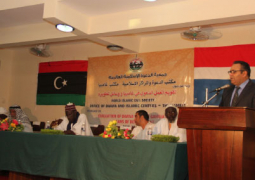The campaign, which commenced in December 2015 through 3 March 2016, was part of activities of the MoU signed between the NCCE and the Independent Electoral Commission (IEC), to enlighten the people about their constitutional rights and responsibilities.
The sensitisation campaign covered more than one 120 selected registration centres in Upper River Region, Central River Region, North Bank Region, Lower River Region and West Coast Region, according to the NCCE.
We would like to reiterate that even though the NCCE is doing what it is mandated to do, they deserve to be recognised and honoured, as the effort is part of preparations for the upcoming electoral cycle. There is no more important task than the development of an informed, effective, and responsible citizenry, which the NCCE has embarked upon. There is no greater duty, living in a democracy, than educating future generations about their constitutional rights and responsibilities, teaching them to stand up and make a difference. For at least a decade now, the NCCE has been doing this noble work in communities throughout the country. Although there is no research-based evidence we can lay hands on, empirical evidence shows that the efforts of the NCCE have helped the masses, the common people, to be informed and understand some provisions of the constitution and other legal instruments on the role and responsibilities of the citizenry. At least, they are cultivating an environment of democratic continuity in The Gambia that would enable all citizens to fully participate in the governance and democratic processes. It is good to note that one of the most basic signposts of a democracy is citizens’ participation in governance. It is not only their right, but it is their duty. Citizens’ participation takes many forms including standing for election, voting in elections, becoming informed, and even participation to build a better democracy. We would, therefore, like to applaud the NCCE for the civic responsibility it too has undertaken to enlighten the populace on such issues as citizens’ political rights and duties; importance of getting a voter’s card; importance of participating in the country’s electoral process; understanding the raison d’être for the supplementary voter registration; qualifications for registration, why and how to register; when to register (date and time); and the dos and don’ts of the registration. There are certain features that are thought to be essential to democracy, such as the presence of a legitimate government based on the will of the people, through free and fair elections. Free and fair elections is not only dependent on the political players - the politicians; the ordinary citizens also have a role to play. This is exactly what the NCCE has been trying to impart in the people to effectively take part in the political and economic build-up of the nation. Democracies are sustained by citizens who have the requisite knowledge, skills and dispositions and the NCCE has produced those kinds of citizens through its civic education service to the people. Civic education is essential to sustain our constitutional democracy; therefore, it should be a prime concern to all and sundry. “It is the State which educates its citizens in civic virtue, gives them a consciousness of their mission and welds them into unity.”



